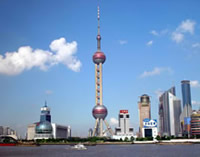|
|


ADVERTISEMENT
Buy Your own advertising
spaces!
.
Download Adobe Acrobat Reader to open [PDF] files.
Recent Visitors
China, Emerging World May Lure Funds for 20 Years, Goldman Says
2009. 3 December
by Hanny Wan Those flows will counter any impact on China’s capital
markets from government measures aimed at curbing over
speculation, said Thomas Deng, Goldman Sachs’ head of China
strategy.
(bloomberg.com)
China and other faster growing
developing nations may lure more funds away from advanced
economies for the next two decades, according to Goldman Sachs
Group Inc.
“Western countries’ money is moving to oriental countries, and that means developed world money is flowing into developing countries,” Deng told reporters in Hong Kong yesterday. “This will be a trend in the next 10 to 20 years.”
Developing economies will expand 5.1 percent in 2010 compared with 1.3 percent growth in advanced nations, according to the International Monetary Fund. Asia-excluding-Japan equity funds posted net inflows of $975 million in the week ended Nov. 25, bringing the total for the year to $18 billion, EPFR Global said on Dec. 1. Flows into China equity funds reached a year-to- date high of $827 million, according to EPFR, which tracks funds holding $10 trillion worldwide.
China Index Forecasts
Goldman Sachs forecasts Hong Kong’s Hang Seng China Enterprises Index will reach 17,000 by the end of next year, according to Deng. That’s higher than his previous forecast of 16,800 in an Oct. 29 report and the gauge’s closing level yesterday of 13,341.17.
China’s CSI 300 Index will hit 4,300 by the end of 2010, Deng said. Hong Kong’s Hang Seng Index will climb to about 27,000 next year, Timothy Moe, an analyst at the brokerage, said at the same media briefing. The CSI 300 closed at 3,957.33 and the Hang Seng at 22,289.57 yesterday.
An unprecedented $1.3 trillion of loans this year and a $586 billion stimulus package pushed China’s economy to record 8.9 percent growth in the third quarter, the fastest expansion in a year. The credit boom helped the Shanghai Composite Index rally 80 percent this year and Hong Kong’s H-share index surge 69 percent. Home prices in 70 major cities in China climbed at the fastest pace in 14 months in October, the government reported Nov. 10.
Real estate in China is “slightly expensive, but not a bubble,” Deng said. The nation needs a gradual exit strategy to prevent a bubble, he said.
Bubble Concerns
China is among the emerging markets facing risks of property and commodity market bubbles, central bank adviser Fan Gang said Nov. 18, echoing the World Bank, which said last month that the nation needs to tackle the “misallocation of resources.” China’s five largest banks have submitted plans to regulators for raising money after record lending eroded their capital, according to four people with knowledge of the matter.
China’s economy will expand 9 percent this year and 11 percent in 2010, mainly driven by domestic demand and will translate into corporate earnings, Deng said.
Investors should also favor companies that will sell shares in Shanghai for the first time next year, Deng said yesterday. China Mobile Ltd., Cnooc Ltd. and China Resources Enterprise Ltd. were named as examples of companies that would likely perform well in Hong Kong ahead of their mainland listings, Deng wrote in his Oct. 29 report.
“Liquidity is favorable to Chinese shares, particularly the Hong Kong-listed Chinese shares,” the analyst said.
To contact the reporter on this story: Hanny Wan in Hong Kong at hwan3@bloomberg.net
Source: www.bloomberg.com

